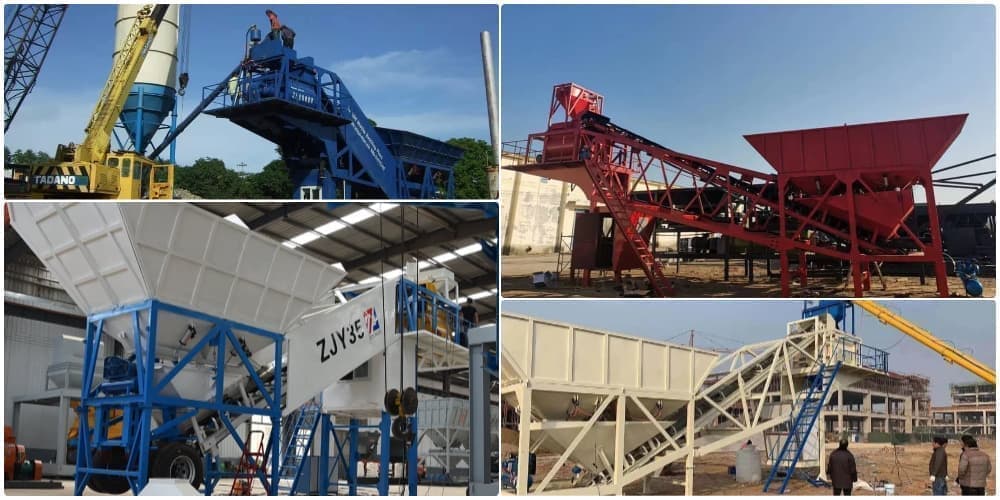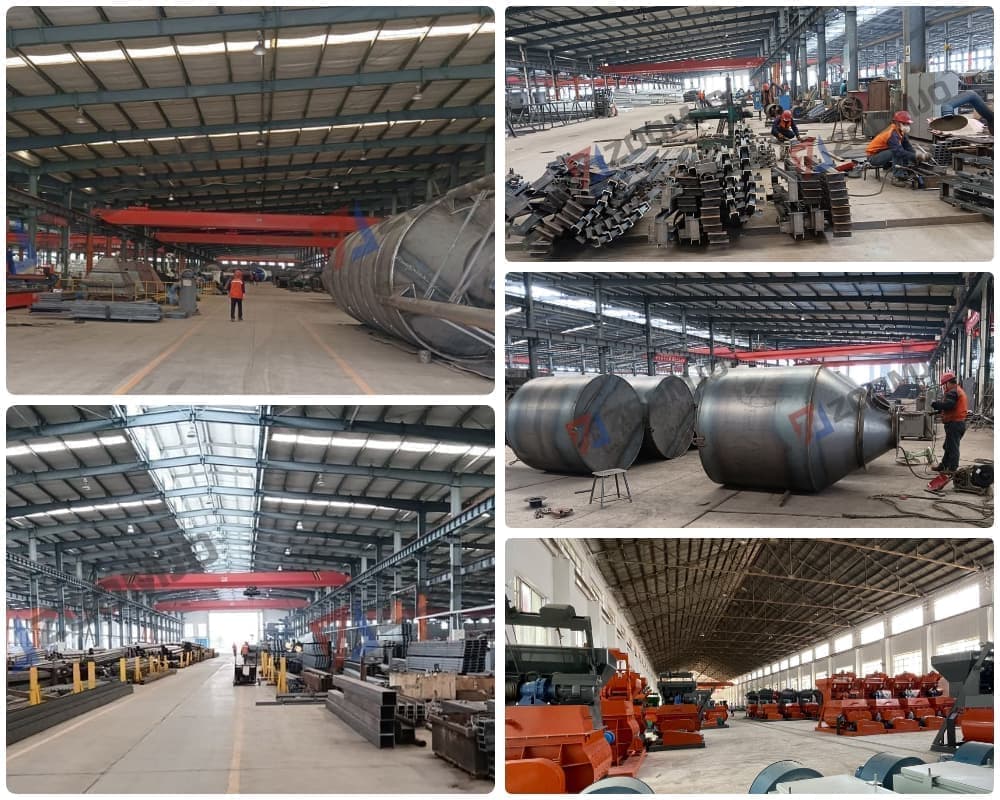Customized Stationary Concrete Batching Plant

The key advantage when customizing a stationary concrete mixing plant is the ability to provide customization to specific production needs. Whether you're looking for high throughput, seamless integration with existing systems, or adaptation to specific environmental conditions, these mixing plants can be designed for optimal performance. Through customization, manufacturers can address unique challenges and improve overall efficiency.
For high throughput requirements, mixing plants can be equipped with large mixers, multiple silos and automation systems to guarantee continuous and fast production. This is critical for large-scale construction projects with high ongoing demand. In addition, customized mixing plants can be designed to seamlessly integrate with existing infrastructure such as conveyors, storage facilities and control systems, streamlining the production process and reducing manual intervention.
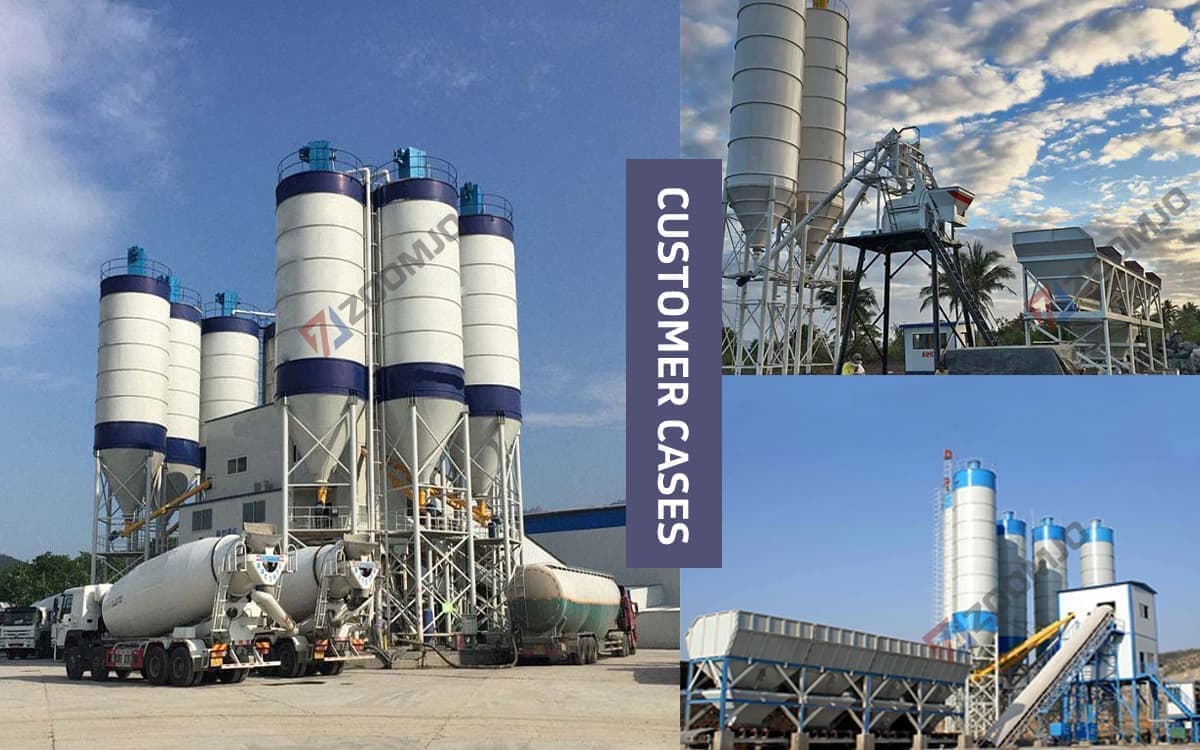
Environmental conditions are equally critical in mixing plant design. In extreme climates, mixing plants can be equipped with insulation, heating or cooling systems to maintain optimal operation. Also, dust removal, water recycling and noise reduction systems are integrated to comply with environmental regulations and minimize environmental impact.
Another highlight of customized stationary concrete mixing plants is the use of high-quality materials and components. Local sourcing ensures that components are adapted to the conditions of the installation site, supporting the local economy while increasing the durability and reliability of the mixing plant. High-quality materials reduce the frequency of maintenance and repairs, extending service life.
Features and Benefits Comparison Table
| Feature | Advantage |
|---|---|
| High Production Capacity | Enhance production capacity for large-scale projects |
| System Integration | Seamless connection with existing infrastructure |
| Environmental Adaptability | Stable operation under extreme climates with minimal impact |
| High-Quality Materials | Enhance durability and reliability, reducing maintenance |
Customizable Stationary Concrete Batching Plant Configurations
Stationary concrete mixing plant is a kind of efficient large-scale concrete production equipment, which is widely used in commercial concrete plants and large precast component plants. Its main configurations include material delivery equipment, material storage equipment, high-precision metering system, twin-shaft forced mixer and fully automated control system to ensure high and consistent quality of concrete. The plant usually adopts a modular design for easy installation and maintenance, and its capacity ranges from 25 to 240 cubic meters per hour, making it suitable for projects of all sizes.
However, the prices of different configurations of concrete mixing plants vary greatly, with simple configurations costing much less than standard or high-end configurations. The price difference mainly depends on the selection of aggregate weighing system (single bin, double bin, multi-bin, etc.), cement weighing system (powder, liquid, etc.), admixture metering system (pumping, gravity, etc.), mixer (type, capacity, etc.) and control system (manual, semi-automatic, automatic, etc.).
Therefore, you should clarify the project requirements and the duration of the project when requesting quotations in order to get a more accurate price quotation and choose the most suitable configuration for the stationary concrete mixing plant.
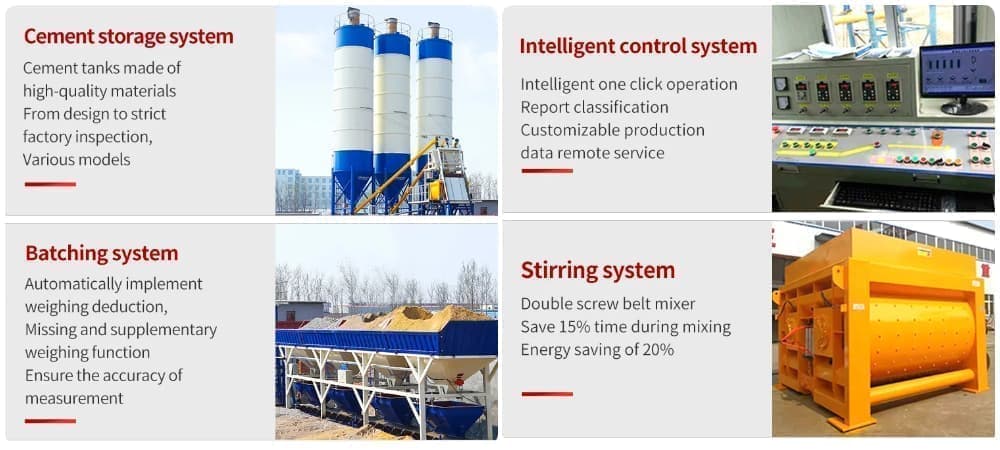
Design Your Customized Stationary Concrete Batching Plant
Creating a customized stationary concrete batching plant begins with a thorough understanding of the specific needs of the project. The preliminary phase includes a thorough site analysis that evaluates the geographic location, environmental conditions and available space. This analysis ensures that the plant design seamlessly integrates with existing infrastructure and complies with local codes and standards.
Following the site analysis, detailed project planning is essential. This phase includes defining production goals, determining required capacity, and selecting appropriate materials and components. Project planning also includes developing a detailed schedule and budget to ensure the project stays on schedule and within financial constraints.
Visualization is an important part of the design process. Using advanced software tools, you can create 3D models of the proposed mixing plant design. These models enable you to visualize the layout of the mixing plant and make necessary adjustments before construction begins. Visualization helps identify potential problems early and ensures that the final design is both efficient and functional.
A significant advantage of customizing your stationary concrete mixing plant is the flexibility of design options. Depending on your specific needs, you can choose between dry or wet mixing configurations. Dry mixing plants are suitable for projects that require high flexibility and quick installation, while wet mixing plants are suitable for projects that require precise water control and higher quality concrete output.
In addition, modular systems offer more customization possibilities. The modular design allows for the combination of multiple components, such as mixers, conveyors and storage silos, to meet your production needs. These systems can be easily expanded or adapted as your needs evolve, providing a scalable solution for expanding operations.
In addition, you can enhance the functionality of your mixing plant with a variety of add-on features. Dedusting systems capture airborne particles during the mixing process to maintain a clean and safe working environment. Water weighing systems ensure accurate measurement of water, which is critical to achieving the desired concrete consistency and strength.
Overall, the process of designing a custom stationary concrete mixing plant involves careful planning, flexible design options and the use of advanced visualization tools. By focusing on these key areas, you can create a mixing plant that meets specific production needs and provides reliable performance.
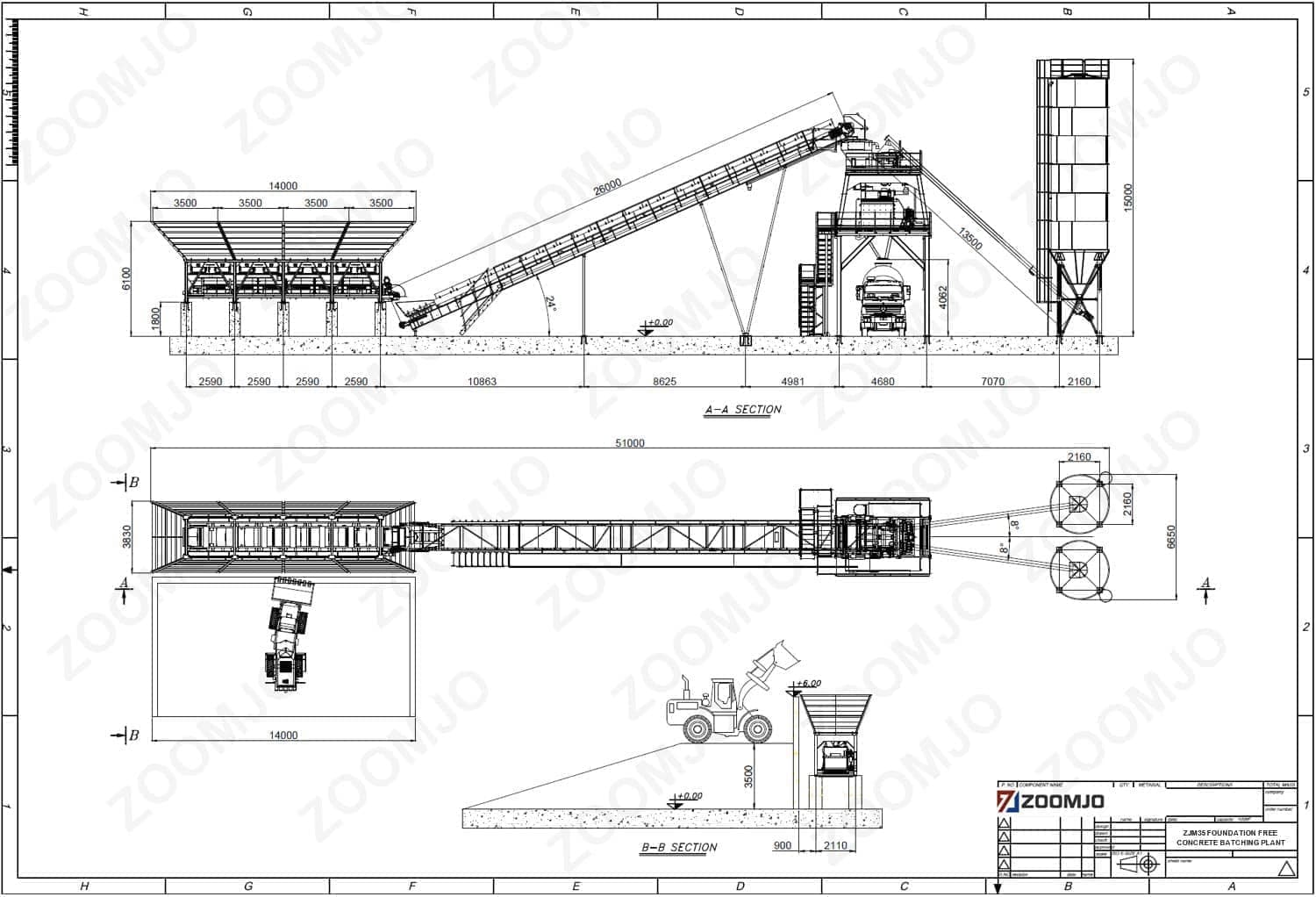
Installation and Commissioning of Customized Fixed Concrete Batching Plant
Installing and commissioning a customized stationary concrete batching plant is a complex but vital task to ensure that the plant operates efficiently and consistently. The whole process begins with the precise assembly of the plant's individual components, ensuring that key components such as mixers, conveyors, silos and control systems are precisely aligned to work optimally.
Component assembly: At the factory or on site, technicians carefully assemble the various parts of the mixing plant, including the mixer, conveyor, silo and control system, to ensure that they fit together precisely.
On-site installation: The assembled mixing plant components are transported to the designated location and securely installed. This step is critical to ensure that the mixing plant is structurally sound and level in order to avoid subsequent operational problems. The installation team is also responsible for safely connecting the plant to the required infrastructure, such as utilities, ensuring that all connections are made in accordance with safety standards.
Employee training: comprehensive team training is essential to ensure that the operating team is proficient in the operation of the mixing plant. The training covers the use of the control system, routine maintenance procedures and safety practices to improve operational efficiency and extend the life of the equipment.
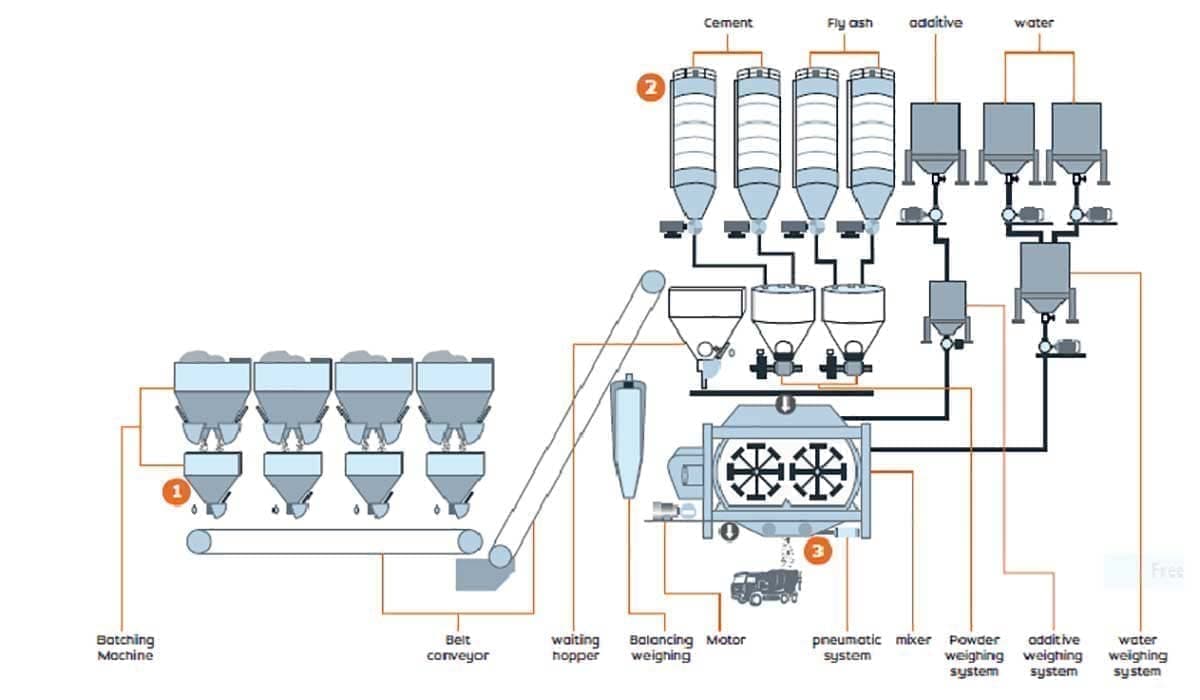
Maintenance and Support
Regular maintenance and support services are essential to ensure the long-term stable operation and optimal performance of the mixing plant. The following are the key points of maintenance services:
-
Regular inspections: Technicians conduct thorough inspections of all components of the mixing plant, including the mixer, conveyor and control system, in order to identify and resolve potential problems in a timely manner.
-
Lubrication and calibration: Moving parts are regularly lubricated, measuring tools are calibrated, and critical components are cleaned to maintain optimum operating performance of the mixing plant.
-
Spare Parts Availability: Ensure that high quality spare parts are well stocked so that they can be replaced when needed, minimizing downtime.
-
Emergency Repair Service: Provide a rapid response emergency repair service to ensure quick on-site diagnosis and repair in the event of an unexpected equipment failure, minimizing disruption to production schedules.
-
After-sales support and training programs: Provide comprehensive after-sales support, including technical assistance and troubleshooting recommendations to help operators solve problems encountered in daily operation. At the same time, training programs are conducted to equip operators with effective maintenance and operation skills of the mixing plant.
Through these meticulous installation, commissioning and maintenance services, the personalized fixed concrete mixing plant is able to achieve high operating standards, meet production demands and ensure long-term stable operation.
Evaluating the investment in a customized stationary concrete batching plant
When considering an investment in a customized fixed concrete batching plant, it is vital to understand the key factors that affect the cost in order to make an informed financial decision. Here are some of the key factors:
-
Plant size: larger mixing plants typically require more materials and more complex designs, which increases costs. But it also means higher production capacity.
-
Customized options: Customized features such as automation, advanced control systems, and specialized mixing technology add to the cost, but can significantly improve operational efficiency.
-
Additional features: Such as dust removal systems, water weighing systems and modular components add to the initial investment but can improve plant efficiency and environmental compliance.
-
Material quality: Using high-quality, locally sourced materials and components ensures the durability and longevity of the mixing plant, but this can add to the overall cost.
-
Site preparation: This includes groundwork, utility connections and site-specific adjustments, etc., which also need to be factored into the total cost.
Estimating financial returns and payback periods
In order to assess the financial viability of an investment, tools such as return on investment (ROI) calculators can be utilized. These tools help potential customers clearly see the potential financial returns by entering the following key variables
-
Initial investment: the total cost of purchasing and installing the mixing plant.
-
Operating Costs: Ongoing expenses including maintenance, labor and utilities.
-
Production Capacity: The ability of the mixing plant to meet production targets and customer demand.
-
Revenue Forecast: Expected revenue based on production output and market value.
The ROI calculator not only helps to compare the economics of different plant configurations, but also demonstrates long-term economic gains and efficiency improvements that can help justify the investment to stakeholders.
By meticulously analyzing these factors and using tools such as the ROI calculator, companies can make informed investment decisions for customized stationary concrete mixing plants that are both budget-friendly and production-ready. This will ensure that the investment not only delivers immediate production benefits, but also realizes a financial payback in the long term.
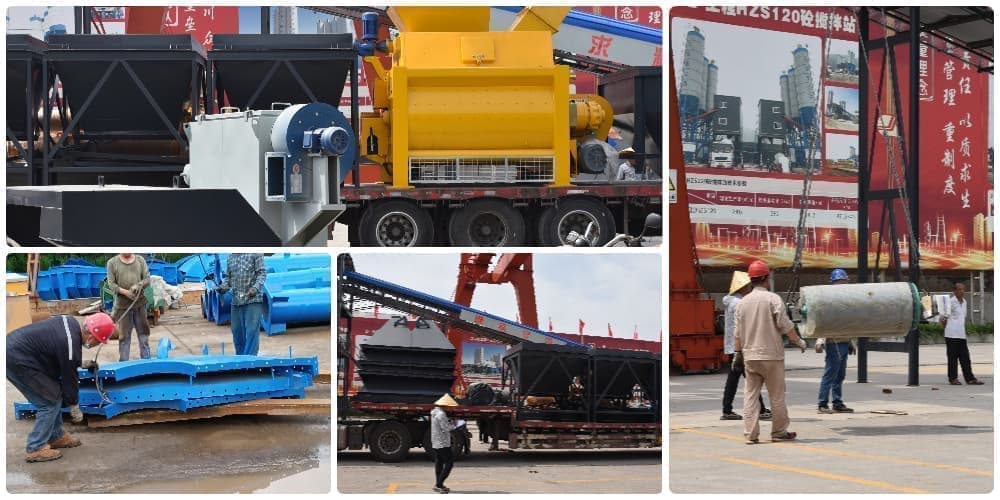
ZOOMJO: 30 years of concrete batching plant expertise, customized solutions for you
ZOOMJO, with 30 years of professional manufacturing experience, specializes in providing comprehensive mixing plant and accessory solutions for the ready-mix and precast concrete industry. We are committed to helping our customers produce high quality concrete efficiently and effectively. Regardless of the size of the project or the type of concrete being produced, ZOOMJO has a mixing plant to meet the needs.
Why choose ZOOMJO?
Tailor-made: ZOOMJO provides one-stop tailor-made service from project demand analysis and design to equipment manufacturing, installation and commissioning, and after-sales service to meet your individual needs.
1. Quality Assurance: Sturdy and durable metal structure, international famous brand components, advanced weighing system and control technology ensure the stable and reliable performance of the equipment and the uniform quality of concrete.
2. Efficient production: Horizontal twin-shaft forced mixer has strong mixing capacity and high output; the compact fixed modular structure is easy to maintain and greatly improves the working efficiency.
3. Wide range of applications: A wide range of models from 25m³/h to 180m³/h, suitable for projects of all sizes.
4. Flexible deployment: Fixed and mobile mixing plants are available to meet the needs of different construction environments.
Your Concrete Batching Plant Experts!
Whether you are a building contractor, precast manufacturer or concrete supplier, ZOOMJO can provide you with professional concrete mixing plant solutions.
If you have any questions about our products or services, please feel free to contact us. We will be happy to serve you!
Custom Fixed Concrete Batching Plant FAQs
Q: What is a customized stationary concrete batching plant?
A: Customized stationary concrete plants are concrete production facilities that are tailored to specific project needs. They are capable of achieving high production rates, seamlessly integrating with existing systems, and adapting to a variety of environmental conditions.
Q: What are the key features of a customized stationary concrete batching plant?
A: Their key features include:
○ High production output: meets large-scale production needs.
○ System integration: works seamlessly with existing production systems.
○ Environmental adaptability: capable of stable operation in extreme climatic conditions.
○ High-quality materials: enhances durability and reduces maintenance frequency.
Q: What is the design process for a customized stationary concrete mixing plant?
A: Design begins with a thorough analysis of the project site, including geographic, environmental and spatial conditions. This is followed by project planning, designing the mixing plant layout using 3D visualization and selecting the appropriate dry or wet mix configuration and modular components based on production requirements.
Q: What are the steps involved in the installation and commissioning of these mixing plants?
A: The installation and commissioning process covers:
● Precise assembly of components such as mixers, conveyors, silos and control systems.
● Transportation of the assembled units to the site and their secure installation.
● Professional training of the operating team, including control system operation, routine maintenance and safety procedures.
Q: Why is maintenance so important on a customized stationary concrete mixing plant?
A: Regular maintenance is essential to ensure long-term operation and optimal performance of your mixing plant. It includes routine inspections, component lubrication, tool calibration, cleaning and timely replacement of spare parts, while emergency repair services and comprehensive after-sales support are also key to ensuring reliable operation.
Q: What factors affect the cost of a customized fixed concrete batching plant?
A: Cost is affected by a number of factors, including:
○ The size and capacity of the mixing plant.
○ Complexity of customized features and technology.
○ Additional environmental and technical features.
○ High-quality materials used.
○ Cost of site preparation and infrastructure connections.
Q: How do I estimate the financial return and return on investment (ROI) of investing in a customized fixed concrete batching plant?
A: By using the ROI calculator and entering data including initial investment, operating costs, expected production capacity and revenue, the financial return and payback period of an investment can be estimated to assess the economic viability of the investment.
Q: What are the benefits of using high quality materials in a customized mixing plant?
A: Using high quality materials can:
● Enhance the durability and reliability of the mixing plant.
● Reduce long-term maintenance and repair costs.
● Support the local economy through local sourcing.
● Extend the life of the mixing plant.
Q: What additional features are available to enhance the functionality of a customized mixing plant?
A: Additional features such as:
○ Dust removal system to improve environmental compliance.
○ Water weighing system to ensure concrete quality.
○ Advanced automation technology to improve operational efficiency.
○ Modular design to increase the flexibility and expandability of the mixing plant.

 English
English  Español
Español  简体中文
简体中文  Pусский
Pусский  українська
українська 